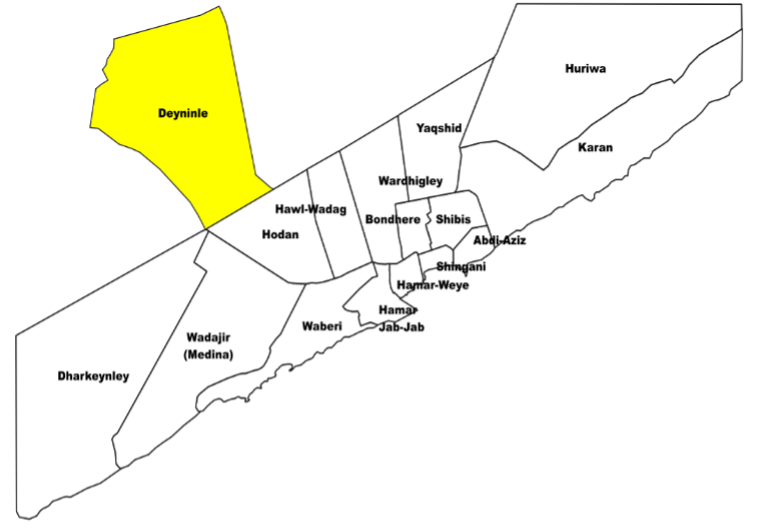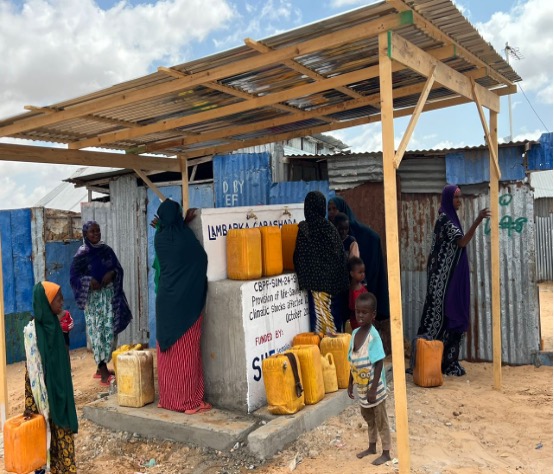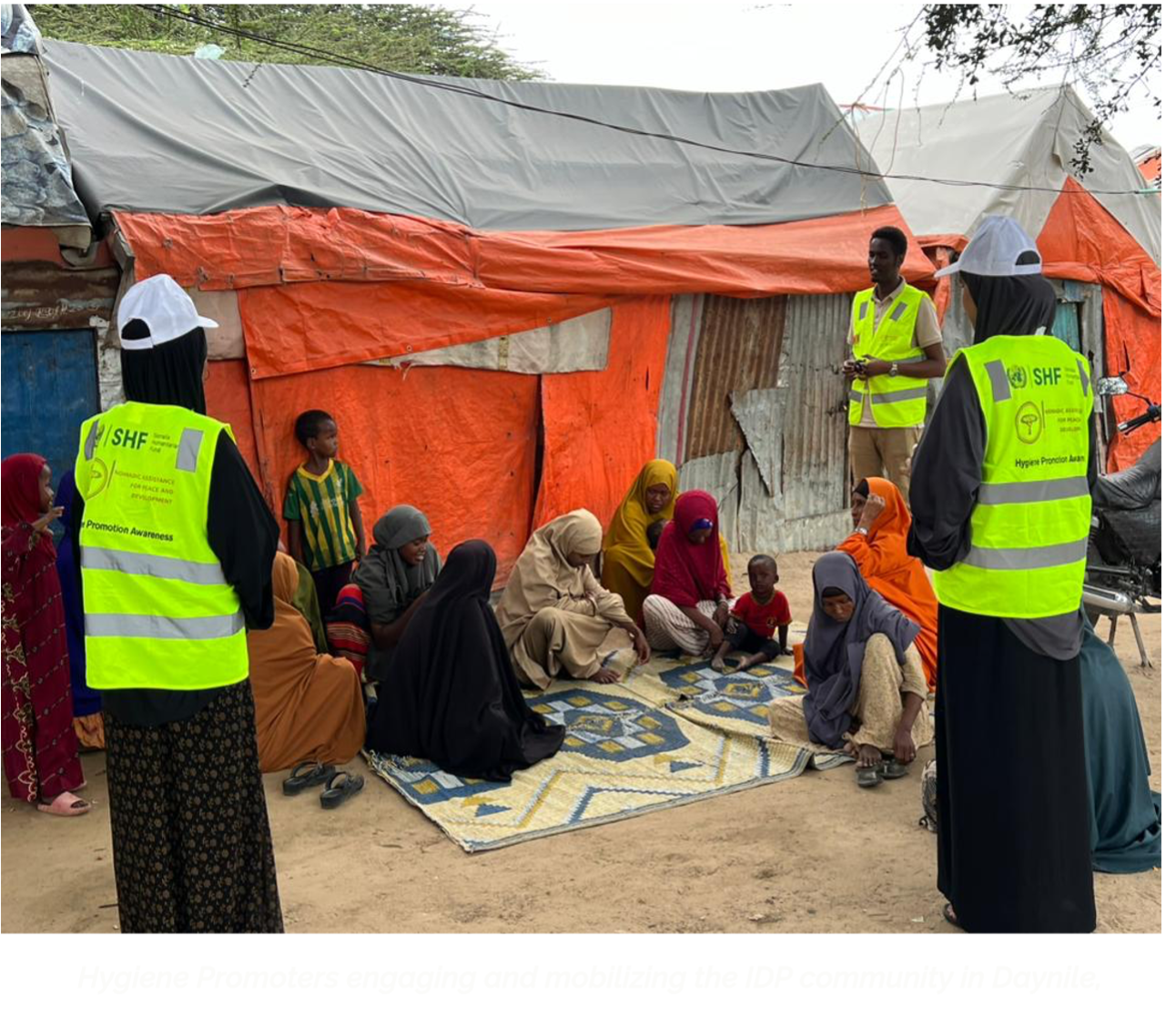Deynile Overview
Daynile is one of the districts in the Banadir region, which is located in south-central Somalia and includes the capital city, Mogadishu. The Banadir region is a significant hub for displaced populations, hosting approximately one million internally displaced persons (IDPs), making it one of the areas with the highest concentration of urban IDPs in Somalia. Alongside Bay region, Banadir holds the largest urban IDP populations in the country, drawing individuals and families fleeing conflict, drought, and economic hardship from various parts of Somalia. Daynile district, like many parts of Banadir, faces ongoing challenges related to infrastructure, sanitation, and access to clean water. The influx of IDPs has placed significant strain on available resources, with issues such as limited access to latrines, poor sanitation facilities, and high costs for drinking water affecting both IDPs and host communities. Many residents are dependent on water vendors due to the lack of affordable, sustainable water sources, and prices often rise during times of crisis, such as floods or periods of intensified displacement. Despite these pressing needs, there is limited organizational support to provide long-term assistance for water, sanitation, and hygiene services in Daynile, leaving both IDP and host communities to navigate these challenges largely on their own.

WASH Challenges in Deynile, Banadir
In Deynile, residents face significant barriers in accessing both latrines and drinking water. Many IDPs are unable to afford adequate sanitation due to the high costs associated with latrine access; only 1% of the host community, but 3% of IDPs, report being able to bear these expenses. Distance further compounds access issues, especially for IDPs, with 12% citing distance as a significant barrier compared to 3% of the host community.
Structural quality is a major concern as well; a large portion of IDP latrines are in poor condition, with 82% reporting damaged facilities, while only 29% of host community latrines are affected. Additionally, latrines lack gender-specific facilities, impacting privacy and security, with 63% of IDPs and 26% of the host community noting this challenge. Poor construction quality is cited by 61% of IDPs and 20% of the host community, indicating a widespread problem. Although security concerns around latrine use are minor, they remain a concern for 4% of IDPs and 1% of the host community. Reports of unequal access between groups are rare but reflect broader issues of equitable resource allocation.
Access to drinking water is equally challenging. The cost of water remains a significant barrier for many IDPs, with 56% citing affordability as a primary issue compared to 40% of the host community. Due to the influx of returnees and IDPs, distance to water sources also hinders access, impacting 26% of IDPs and 13% of the host community. Water quality issues affect 34% of IDPs and 21% of the host community, while damaged sources further restrict access for 32% of IDPs and 16% of the host population.
During floods and periods of displacement, the cost of water often rises as vendors increase their prices due to damaged boreholes and increased demand. Unfortunately, no organization currently provides sustainable water or sanitation assistance, leaving residents, particularly the IDPs, struggling to meet their basic needs. (DURABLE SOLUTIONS PROGRESS (DSP) SURVEY – September 2024 )

In response to the significant challenges faced by the residents of Daynile, particularly internally displaced persons (IDPs), Nomadic Assistance for Peace and Development (NAPAD), with support from the Somalia Humanitarian Fund (SHF), is actively addressing critical issues related to water, sanitation, and hygiene (WASH). The residents of Daynile face numerous barriers to accessing safe drinking water and adequate sanitation, including high costs, poor infrastructure, and a lack of accessibility. NAPAD’s ongoing efforts aim to tackle these challenges directly, improving the living conditions of vulnerable communities.
One of the primary barriers to water access is affordability. Many IDPs are unable to bear the high costs of water, as evidenced by reports of the population’s reliance on costly water vendors. To mitigate this, NAPAD is expanding water distribution networks within IDP settlements, ensuring that communities have access to safe drinking water. In addition, emergency water supply assistance is being provided through a voucher system, benefiting approximately 6,600 individuals. This intervention addresses the critical need for water, particularly during times of displacement and crisis.
Addressing the challenge of sanitation, NAPAD is undertaking substantial work to improve latrine access and quality. The poor condition of latrines in the area, especially for IDPs, has been a pressing concern, with many facilities

NAPAD is also responding to the lack of hygiene education and poor sanitation practices. To combat this, the organization is distributing hygiene kits to 1,100 individuals and conducting hygiene training for 12 community members. These efforts are intended to raise awareness about proper hygiene practices and empower individuals to take responsibility for their health and wellbeing. Additionally, NAPAD is running widespread hygiene promotion campaigns, expected to reach 15,048 people, to reinforce hygiene messages and encourage behavior change.
The issue of waste management is another critical challenge in Daynile, with many communities facing problems with solid waste and inadequate disposal facilities. NAPAD is addressing this by distributing 12 sanitation tool kits to support community-led cleaning initiatives and organizing 16 environmental cleanup campaigns aimed at improving sanitation and reducing waste.
Through these targeted interventions, NAPAD is addressing the immediate challenges faced by IDPs and vulnerable communities in Daynile. By improving access to safe drinking water, enhancing sanitation facilities, promoting hygiene education, and fostering community involvement in waste management, NAPAD is helping to improve the health and resilience of these populations. These efforts not only address urgent needs but also lay the foundation for long-term improvements in the living conditions of those most affected by displacement and poverty.
Humanitarian GAPs in Daynile
The cost and accessibility of latrines remain pressing challenges. Very few IDPs are able to afford latrine access, making financial support and subsidy programs essential to improve affordability. Additionally, the distance to sanitation facilities disproportionately affects IDPs. Humanitarian organizations must prioritize the establishment of accessible, affordable sanitation facilities that are strategically placed to serve both IDPs and host communities. Structural quality of existing latrines also poses significant issues, as many IDP facilities are in disrepair and lack basic gender-specific options. Addressing these needs requires immediate investment in rehabilitating damaged latrines, constructing safe, gender-specific facilities, and ensuring the quality and durability of new constructions. Safety and equitable access are paramount to ensure dignified sanitation options for all.
The cost of water remains a prohibitive factor, with affordability being a major barrier. Price fluctuations during floods and displacement events further exacerbate the problem, while damaged water sources and increased distances to water points add to the burden. Humanitarian actors must intervene to establish affordable, resilient water systems and provide sustainable support for repairs and maintenance of damaged sources.
While efforts by NAPAD have contributed to addressing some of these needs, critical gaps remain unfilled, leaving residents vulnerable to health risks and insecurity. We call on humanitarian partners to prioritize Deynile for immediate, coordinated action in water and sanitation. This includes implementing subsidies, supporting infrastructure development, and enhancing access to safe and reliable resources.

